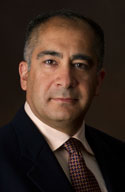 Dr. Sayed Mirbod
Dr. Sayed Mirbod
A physician friend recently asked me to explain the functions of various dental specialties. When I reached periodontics, I repeated what I had learned in dental school 20 years ago: the objective of periodontics is to maintain healthy, functional teeth for as long as possible. But I realized that it's much more than that. Dentistry has changed profoundly over the last twenty years and developed into an evidence-based discipline—and periodontics has been at the forefront of this transformation.
Modern periodontics includes as its main pillars periodontal medicine, regenerative therapy, periodontal plastic surgery and dental implant surgery. Occlusal rehabilitation and treatment of temporomandibular disorder are also treated by many periodontists. With the increase in evidence-based dentistry, the emphasis on surgical techniques shifted to encompass a wider understanding of oral health that included the prevention and treatment of disease. In addition to mastering surgical techniques, periodontists must also understand the overall benefits of a proposed treatment.
The importance of periodontal therapy is easily illustrated if we look at our aging society and the increasing numbers of people that are reaching age 65. This older segment of society differs from previous generations not only in terms of life expectancy, but also in terms of their higher expectations when it comes to standard of living, which includes dental aesthetics and function. In other words, the aging population has a higher dental IQ with correspondingly higher expectations.
Disease prevalence is another factor the makes periodontal medicine uniquely suited to address the needs of our aging population. Diabetes, arthritis, cardiovascular disease and a host of other disorders make older patients susceptible to tooth loss. In addition to traditional periodontal procedures aimed at reducing inflammatory disease, older patients benefit from regenerative procedures and periodontal plastic surgery that can prolong the life of existing dentition and provide better function and aesthetics. And if dental implants are unavoidable, good periodontal health can help ensure implant success.
Dr. John O'Keefe, CDA director of knowledge networks asked the Canadian Academy of Periodontology (CAP) to contribute to JCDA Clinical Q&A at www.jcdablogs.ca. CAP has agreed to provide JCDA readers with an evidence-based perspective of relevant topics in periodontics through contributions to Clinical Q&A, including periodontal medicine, regenerative therapy, periodontal plastic surgery and dental implant surgery.
JCDA readers can suggest topics of interest through the CAP website at cap-acp.ca, which features information for both patients and dentists. Patients can read about common periodontal therapies in an easy to understand format that includes pictures for various surgeries. Dentists can find contact information for all CAP members. We encourage you to connect with your local CAP member as we are always happy to be of assistance to our colleagues.
